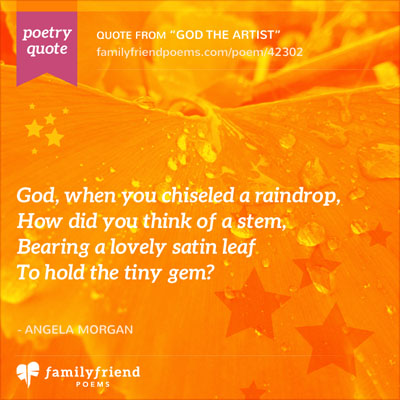41. June In Maine
Famous Poem
Beautiful, beautiful summer!
Odorous, exquisite June!
All the sweet roses in blossom,
All the sweet birdies in tune.
Famous Poem
Beautiful, beautiful summer!
Odorous, exquisite June!
All the sweet roses in blossom,
All the sweet birdies in tune.
Advertisement
Advertisement
Famous Poem
When a feller feels a longing
For the medder in his breast.
When the robins north are thronging,
Where they haste to build their nest.
Advertisement
Advertisement
Famous Poem
Full of joy is early Summer,
Growth and warmth and golden light;
Every day is crowned with beauty,
Full of loveliness the night.

Famous Poem
The mountain sat upon the plain
In his eternal chair,
His observation omnifold,
His inquest everywhere.

Famous Poem
God, when you thought of a pine tree,
How did you think of a star?
How did you dream of the Milky Way
To guide us from afar.

Famous Poem
I came to the mountains for beauty
And I find here the toiling folk,
On sparse little farms in the valleys,
Wearing their days like a yoke.

Famous Poem
November now is here,
With skies of leaden hue,
And gloomy days and drear,
And winds that pierce us through.
Famous Poem
My Sorrow, when she's here with me,
Thinks these dark days of autumn rain
Are beautiful as days can be;
She loves the bare, the withered tree;

Famous Poem
The winter wood is like a strong old man,
Grizzled, rugged, and gray,
With long white locks tattered by many storms.
He lifts gnarled arms defiant of the blasts,
Famous Poem
Out of the bosom of the Air,
Out of the cloud-folds of her garments shaken,
Over the woodlands brown and bare,
Over the harvest-fields forsaken,

Famous Poem
HERE in a quiet and dusty room they lie,
Faded as crumbled stone and shifting sand,
Forlorn as ashes, shrivelled, scentless, dry -
Meadows and gardens running through my hand.

Famous Poem
I sometimes think that thus was born the world—
Not like a blinding sun from chaos hurled
To blaze and burn for ages—that it woke
As wakes the forest, wakes the verdant oak,
Famous Poem
The sky is gray as gray may be,
There is no bird upon the bough,
There is no leaf on vine or tree.

Famous Poem
Tyger! Tyger! burning bright
In the forests of the night,
What immortal hand or eye
Could frame thy fearful symmetry?

Famous Poem
When some one has slipped you the dirk in the dark,
When eyes that are loving are lies,
When some one you trusted has made you a mark,
And somehow the heart in you dies,

Famous Poem
Farewell to the Highlands, farewell to the North,
The birth-place of Valour, the country of Worth;
Wherever I wander, wherever I rove,
The hills of the Highlands for ever I love.
Famous Poem
A bursting into greenness;
A waking as from sleep;
A twitter and a warble
That make the pulses leap:

Famous Poem
My mind lets go a thousand things
Like dates of wars and deaths of kings,
And yet recalls the very hour--
'T was noon by yonder village tower,
Famous Poem
O little wave, you come from far,
Over the sky-line yonder.
Why do you hurry across the bar
And fight with the wind, I wonder?

Famous Poem
A world of snow, and winter yet,
The weather-man decrees.
He listens to the bragging wind,
I hearken roots of trees.